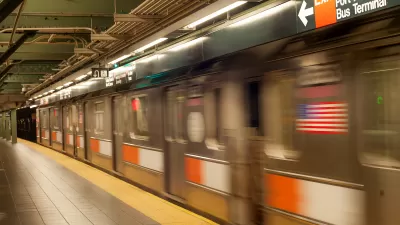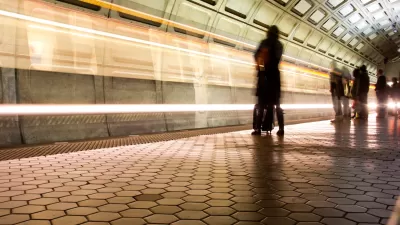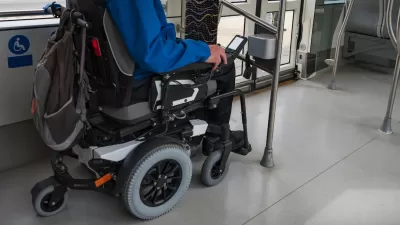Another recent ruling is forcing the agency to accelerate its efforts to make all New York subway stations accessible to people with disabilities and mobility issues.

In a long-overdue victory for people with disabilities, a federal judge ruled that New York City’s Metropolitan Transportation Authority (MTA) must equip 95 percent of its rail stations with elevators or ramps, reports Jose Martinez in The City.
“The MTA announced the settlement last June — agreeing to install elevators or ramps by 2055 at the more than 300 stations that are currently inaccessible to wheelchair users and others with mobility impairments — but it wasn’t made official until Friday.” Today, roughly one quarter of the system’s 500 stations are in compliance with the Americans with Disabilities Act (ADA), notes Martinez.
The settlement includes a requirement to meet certain milestones along the way to full compliance in 2055, such as a requirement that “15% of New York City Transit’s portion of future capital plan funding must now be set aside for accessibility upgrades.”
Since the passage of ADA in 1990, cities and agencies have lagged in bringing public transit facilities and the public right-of-way into compliance. Another federal lawsuit accuses the MTA of neglecting to properly maintain the elevators that do exist at stations. Last December, the agency released a plan detailing designs for elevators and other accessibility upgrades at some of its stations, funded in part by private developers.
FULL STORY: Judge Approves MTA Deal to Make Subways 95% ADA-Compliant by 2055

Planetizen Federal Action Tracker
A weekly monitor of how Trump’s orders and actions are impacting planners and planning in America.

Restaurant Patios Were a Pandemic Win — Why Were They so Hard to Keep?
Social distancing requirements and changes in travel patterns prompted cities to pilot new uses for street and sidewalk space. Then it got complicated.

Maui's Vacation Rental Debate Turns Ugly
Verbal attacks, misinformation campaigns and fistfights plague a high-stakes debate to convert thousands of vacation rentals into long-term housing.

In California Battle of Housing vs. Environment, Housing Just Won
A new state law significantly limits the power of CEQA, an environmental review law that served as a powerful tool for blocking new development.

Boulder Eliminates Parking Minimums Citywide
Officials estimate the cost of building a single underground parking space at up to $100,000.

Orange County, Florida Adopts Largest US “Sprawl Repair” Code
The ‘Orange Code’ seeks to rectify decades of sprawl-inducing, car-oriented development.
Urban Design for Planners 1: Software Tools
This six-course series explores essential urban design concepts using open source software and equips planners with the tools they need to participate fully in the urban design process.
Planning for Universal Design
Learn the tools for implementing Universal Design in planning regulations.
Heyer Gruel & Associates PA
JM Goldson LLC
Custer County Colorado
City of Camden Redevelopment Agency
City of Astoria
Transportation Research & Education Center (TREC) at Portland State University
Camden Redevelopment Agency
City of Claremont
Municipality of Princeton (NJ)





























